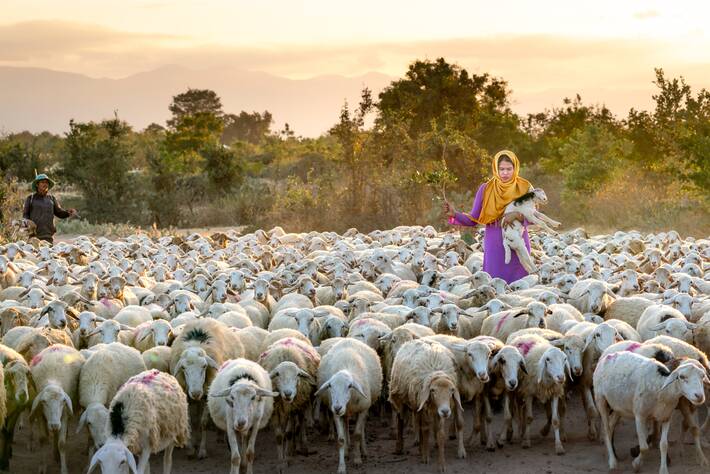
|
AO Director-General calls at UN General Assembly for decisive action to tackle antimicrobial resistance (AMR)
Monday, 2021/05/03 | 06:16:18
|
Need to address the double challenge of meeting growing demands for animal proteins while reducing AMR risks
The One Health approach recognises the strong links between humans, animals and the environment.
29 April 2021, Rome/New York - Antimicrobial resistance (AMR) is becoming an increasing threat to global health, food safety and security, potentially also leading to substantial socio-economic damage, and to turn this around, the Director-General of the Food and Agriculture Organization of the United Nations (FAO), QU Dongyu, today called for coherent, swift and decisive action.
Qu spoke at the day-long High-Level Interactive Dialogue of the General Assembly on AMR, which saw the participation of world leaders, UN experts, business and civil society leaders to discuss practical steps to address AMR in the midst of COVID-19 recovery plans.
Also speaking at the opening session were Volkan Bozkir, President of the 75th Session of the UN General Assembly; Amina J. Mohammed, UN Deputy Secretary-General; Sheikh Hasina, Prime Minister of Bangladesh and Co-chair of the One Health Global Leaders Group on Antimicrobial Resistance; Mia Mottley, Prime Minister of Barbados and Co-chair of the One Health Global Leaders Group on Antimicrobial Resistance; Tedros Adhanom Ghebreyesus, Director-General, World Health Organization; Monique Eloit, Director-General, World Organisation for Animal Health; and Joyce Msuya, Deputy Executive Director, UN Environment Programme.
Antimicrobial drugs are key in the treatment of diseases and their use is essential for both human, animal and plant health. However, the misuse and overuse of antimicrobials is a major concern for the emergence and spread of antimicrobial resistant micro-organisms. Due to AMR, drug-resistant infections are placing an ever-increasing burden on human and animal health as well as the environment.
"We need to keep antimicrobials working. Simply waiting for new drugs is not an option because of the extraordinary cost and complexities of research and development. Without effective, efficient medicines, the spread of infectious diseases threatens to escalate out of control," said the FAO Director-General.
Qu urged for strengthened multi-sectoral collaboration and capacity building, and the promotion of prudent and responsible use of antimicrobials across agriculture and food sectors.
The Director-General also underscored the need to tackle the double challenge of meeting demands for animal proteins - expected to rise by 45 percent by 2050 - while reducing the risks of AMR.
Tackling AMR threats together
FAO believes that AMR threats can only be successfully tackled if everyone works together.
At country level, this means a range of ministries - from health, food, agriculture to environment - working together alongside the private sector and other non-state actors.
In this regard, the FAO Director-General said he was encouraged by the increasing number of countries who have introduced exemplary policies, took concrete actions and showed strong political will to combat AMR.
At global level, with far- and wide-reaching impacts, a leading example of collective efforts to fight AMR is the work of the FAO/OIE/WHO Tripartite Collaboration on AMR with UNEP.
This includes the establishing of initiatives such as the One Health Global Leaders Group on AMR and the Partnership Platform for Action Against AMR that pave the way for shared vision and collective global actions to tackle AMR.
The FAO Director-General underscored the need to promote an effective and coordinated One Health approach - which recognises the strong links between humans, animals and the environment and the need to tackle global health threats holistically - at all levels, involving all related parties.
To accelerate actions under this approach on the ground, the Tripartite calls for more funds, in-kind contributions and resources to scale up operations globally and at country level, said Qu.
"We are determined to the noble mission for One Health World without hunger and poverty," concluded Qu.
FAO's work on AMR
Antimicrobial resistance in animal pathogens is already affecting domesticated animals and as a result impacts livestock production, which undermines food safety and security.
In addition, antimicrobial-resistant pathogens can develop and spread along food chain and move between animals, humans, and the environment. It means they may also be in the food we eat and water we drink.
Being a multidisciplinary organization, FAO plays a key role in providing integrated and coherent assistance to countries in regulating and monitoring the use of antimicrobials and in preventing and minimizing the development of resistance across all sectors.
In addition, FAO's experience in capacity development allows it to respond to countries' requests for support on the use of antimicrobials and the prevention and control of AMR, among other issues.
To support its Members, FAO developed a series of tools to support food and agriculture sectors in managing AMR. One such tool is the FAO Assessment Tool for Laboratories and AMR Surveillance Systems (FAO-ATLASS) - a tool for assessing and defining targets to improve national AMR surveillance systems in the food and agriculture sectors. Another, the Progressive Management Pathway for Antimicrobial Resistance (FAO-PMP-AMR) - a guide that helps Members put their National Action Plans on AMR into action.
|
|
|
|
[ Other News ]___________________________________________________
|


 Curently online :
Curently online :
 Total visitors :
Total visitors :



















